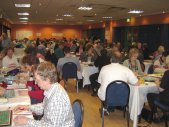My First Scrabble Tournament
I was playing on the Internet Scrabble Club for a year before I entered my first tournament, and at one stage I thought I never would. I suffer from some anxiety and once told an ABSP member that I would never be able to play real-life tournaments.
 This changed as I grew in confidence, but I feel I may have entered a tournament much sooner had I actually known what to expect. I'd never succeeded in finding a guide for beginners written by a beginner. So, here I am endeavouring to write such a thing.
This changed as I grew in confidence, but I feel I may have entered a tournament much sooner had I actually known what to expect. I'd never succeeded in finding a guide for beginners written by a beginner. So, here I am endeavouring to write such a thing.
General tips
The first thing is to arrive in plenty of time, and register at the front desk as soon as you get there. It can get very hot in the playing area so bring a large bottle of water with you, and by the same token, locate where the toilets are so you can get to them quickly between rounds. I didn't bring any drinks with me, and found myself experiencing some light-headedness during the later rounds.
The tables will be numbered, and all the games in the divisions will take place on the same set of tables. You can find who you are playing (and where) by looking at the fixture lists which will be pinned up around the room, and will generally attract crowds of people as soon as they are put up.

Once playing your game, briskness is advisable. Twenty-five minutes in real life is considerably less than 25 minutes on the ISC, because doing things like tile tracking on your own time can cost you a lot of valuable minutes. Make sure you start your opponent's clock as soon as you have declared the score of your move. Read the ABSP's Advice For New Players page just so that you know the correct procedure, although it's not complicated.
Tournament players have a wide range of ratings; in my first one, ratings ranged from 190 to below 90. It is generally considered that dividing your ISC rating by 10 will give you an ABSP rating accurate to within 10 points or so. There was a range of ISC ratings from about 1900 to 900.
All six players I played were friendly, and if I had a query about the rules/score, they had no problem stopping the clock and making sure we agreed. There was no problem talking to the opponent before the game started either. But, if you want to chat after the game, best go to get a coffee in case you disturb other players. Don't feel that you will be sitting in silence for 6 hours because you will not be!
Challenging
If your opponent plays a word that you are want to challenge, wait until he has announced his score and hit his clock. If you say 'challenge' before he has done so, he is perfectly entitled to take the move back and play a different one, as it is still his turn.
After he hits his clock and starts yours, say 'challenge' and hit the neutralise button in the centre. Write the word down on the challenge slip (provided) in one of the boxes. If you are challenging more than one word on the same play, put them in the same box. Show the slip to your opponent and make sure you agree that the word is legible. Hold the slip in the air and a runner will take it from you. Simply wait for it to be returned with a tick or cross next to it. If it's a cross, your opponent will have to remove their play from the board.
If you play the last move of the game (i.e. play out), pause the clock rather than restarting your opponent's time.
The challenge slips will be put on the table before the game starts. You don't have to collect them or bring them from home yourself.
Changing
When changing letters, put the letters face down in front of your rack and announce 'change X,' X being the number of tiles you would like to change. At this point, restart your opponent's clock and then draw the replacement tiles.
Submitting the final result
On the challenge slip, there will be a section at the bottom. Read this carefully before filling it in. The winner puts his name and the spread on the top line, and the loser puts his on the line below. The loser signs the final box to make the form official. When it is completed, hold the form up and a runner will take it to the front, and the game is now officially over. You're free to leave the table and get a drink; you'll likely have a few minutes until the next round starts.
Make sure you know your player number. This is a sort of identification number. You can find it on the board where the game fixtures are listed. This number stays the same all day, so memorise it or write it down. But if you do forget it, just go to the fixtures board and look for your name.
I had a fantastic time at my first event and I hope this guide will encourage other people play. Have fun!
Martin Gardner, 2005